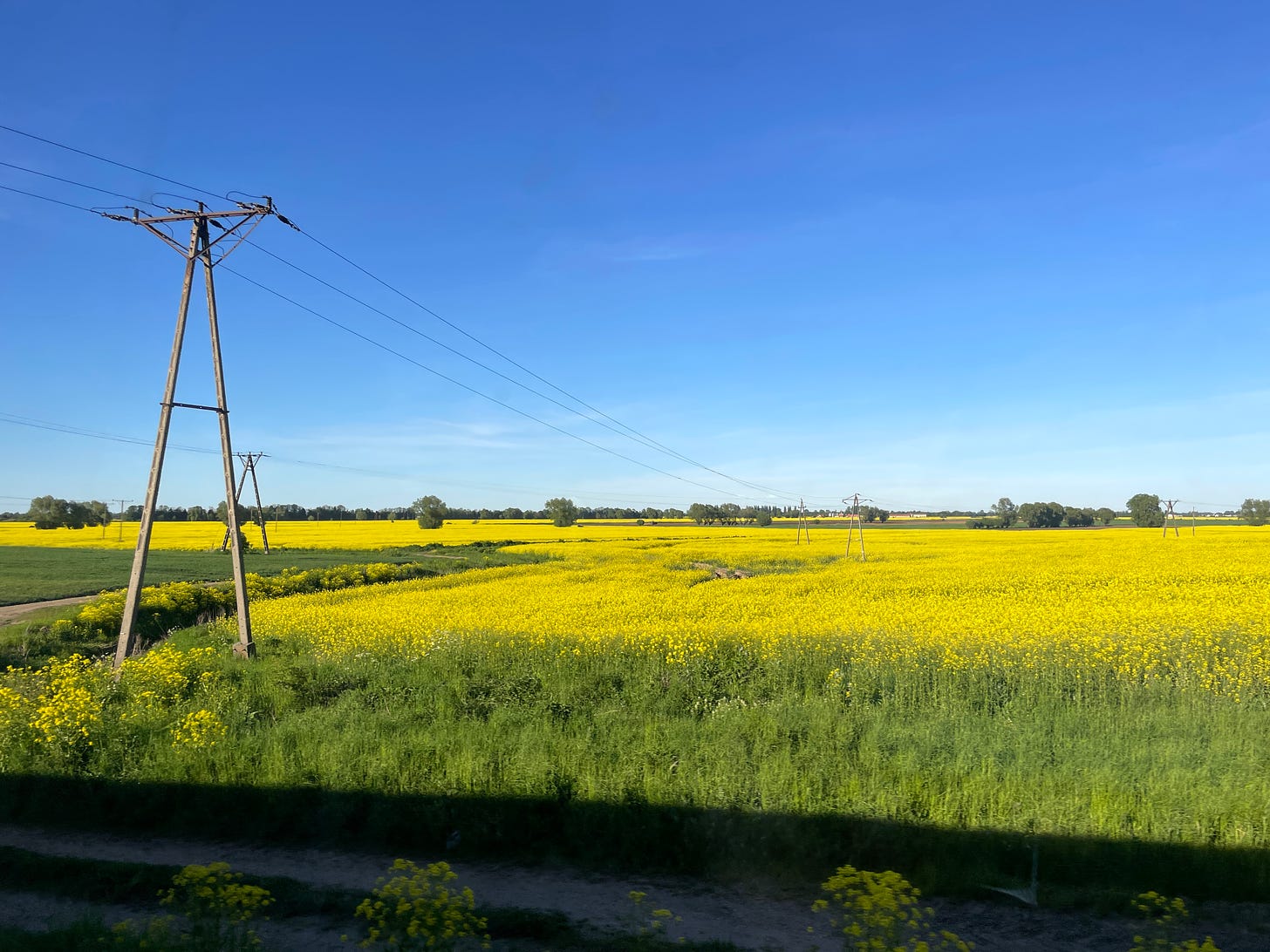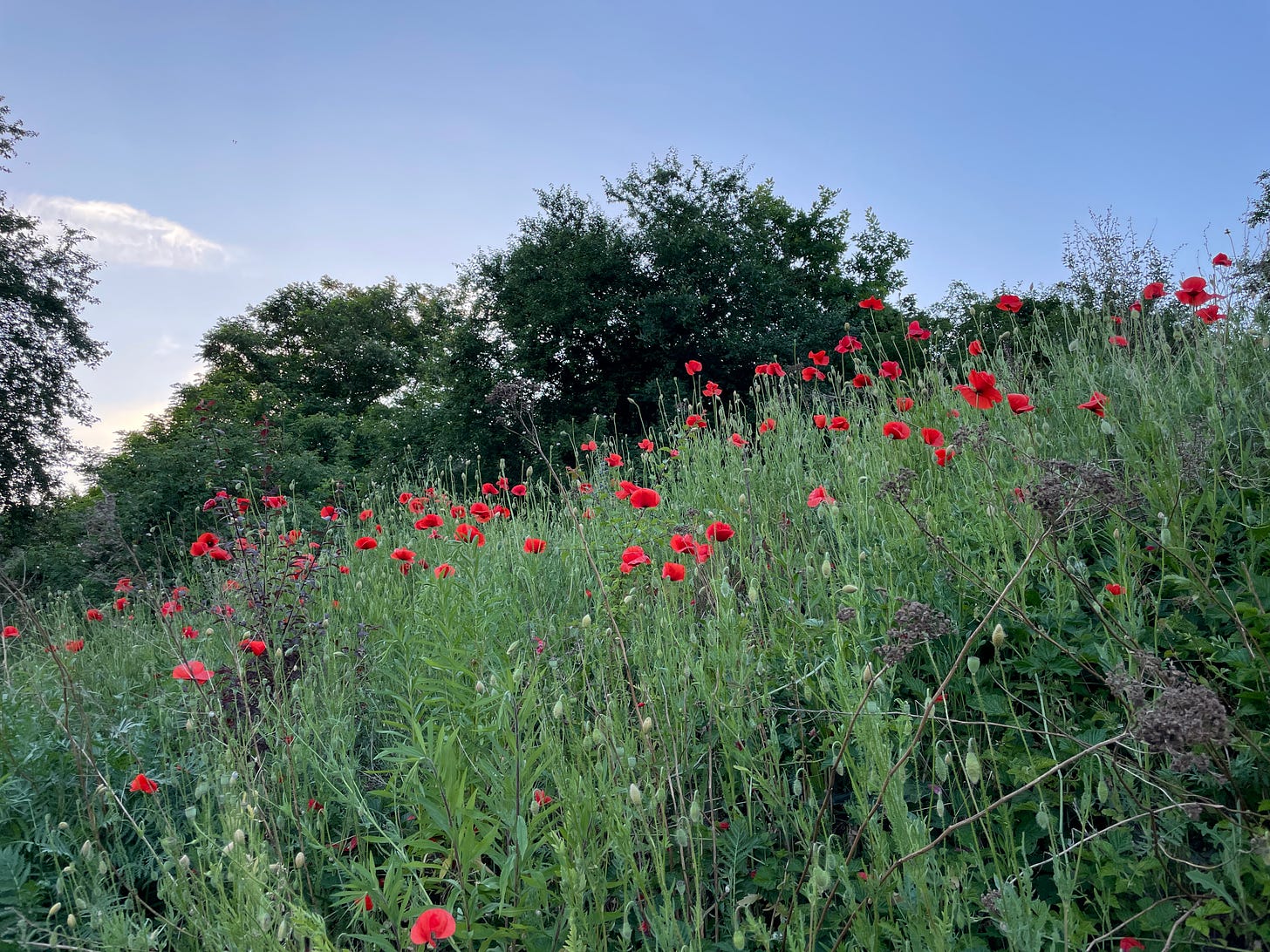This week, I returned from Poland, where I spent a month with my family. On the way back, I had a long transfer at one Western European city, so I decided to leave the airport and go for a walk. I’d never been in that place before, and despite the heavy backpack and early hours, I was excited to explore it. The streets had lots of cafes and little shops selling flowers, the roads were made of cobblestone, and crowds of people were heading to work on bicycles. As I walked around the river in the city center, I thought that the town looked exactly what you would expect from Europe, but at the same time, it was pretty typical and even boring. In Eastern Europe, everything wasn’t so polished, but it had a soul. The downtown of the city where my family found refuge wasn’t predictable and had interesting turns and corners with distinctive features and atmosphere. I looked at sophisticatedly dressed people around me and thought that I would absolutely choose the sincerity and realness of Eastern Europeans over Western European's cold politeness.
During my walk, I thought that Eastern Europe could have the same level of development and wealth if not for Russian colonialism, communism, and wars. I thought about how much beauty and opportunities were destroyed, and how much wealth, historical artifacts, and art were stolen. Most importantly, how many Eastern Europeans were killed: scientists, economists, engineers, medics, writers, artists, musicians, and everyone brave, energetic, and determined to develop their country and not bow down to oppression and dominance.
As I walked the streets of a random city in Western Europe and looked at old buildings not touched by destruction, I thought about how differently Eastern European towns could look if they weren’t mutilated by bombs and communism. Instead of spending money on rebuilding everything from scratch, Eastern Europeans could spend it on development and preservation, as Western Europeans did. So many ifs, so much injustice.
In 1939 Poland was occupied by Nazi Germany and the Soviet Union, with the latter controlling 48% of Polish territory. Both of the oppressors were continually destroying and suppressing Polish sovereignty, people, and culture over the years.
Hundreds of thousands of Poles were imprisoned by the NKVD (Soviet Secret Police). By Stalin’s order, more than 20 thousand prisoners (officers, government officials, business owners, and intellectuals) were mass executed in Katyn forest. More than a million Polish people, mostly women, were sent to Siberia and remote areas of the Soviet Union. Half of them died there.
From the other side, Nazi Germans wiped out Polish intellectuals, resettled hundreds of thousands of people, and built five concentration camps, including Auschwitz. Warsaw, Poland’s capital, was leveled, and almost 90% of the city was destroyed. Gdansk, a crucial port city by the Baltic Sea, was destroyed by 95%. Poland lost approximately 6 million people in WW2.
After the Soviet Army expelled Germans from the Polish territory in 1945, the Yalta Conference was held between the heads of government of the United States, the United Kingdom, and the Soviet Union. In order to maintain a good relationship with the Soviet Union and pursue the West’s interests, it was decided to sacrifice Poland and the rest of Eastern Europe and allow them to fall under Soviet influence and domination. The puppet governments established by the Soviet Union, communism, and severe repressions set back the development of the region for many years. While the world celebrated freedom and the end of the war, the oppression of the Eastern Europeans continued. Only in the 1990s, forty-five years later, Eastern European countries managed to break free from Soviet rule and communism.
The betrayal that Polish people and other Eastern Europeans experienced is hard to describe. The lives and freedom of millions of people were sacrificed for the prosperity of the chosen Western countries.
Reading about how Poland and Eastern Europe were handed to Russia in 1945, I can’t help but see the parallels of how Western politicians want to sacrifice Ukraine to Russia now.
Even after Eastern Europeans persevered, rebuilt their cities after the WW2 war, got rid of Russian oppression and communism, and finally started to develop their countries the way they always wanted, the way Western Europeans have been doing for decades, — they are treated as if what they went through was their fault. Destroyed and worn-out buildings are viewed as negligence, not as a sign of suffering and resilience. The fact that the world doesn’t know many Eastern European writers and scientists is viewed as if people in this region are less intelligent and talented, not as a result of enormous losses, mass executions, and deportations. Attempts of Eastern Europeans to revive their countries and cultures are viewed as a lack of history and authenticity instead of determination to save history and be authentic selves.
Russian dominance and communism, to which Western leadership subjected Eastern Europeans, had a devastating impact on the economy and quality of life. The consequences are still visible, and people judge Eastern Europeans for them, forgetting who and what caused it. Moreover, the West continues to view Eastern Europeans through Russian colonial lenses and treat them as second-class citizens from the “ex-Soviet countries in Moscow’s backyard.”
Eastern Europe is not Western Europe, and it cannot be measured by the same standards. You cannot come to the house of someone who rebuilt it from scratch after it was burnt and robbed multiple times and say that it’s not wealthy enough. You cannot compare it to the neighbor’s house, which wasn’t looted and destroyed and had all the family belongings and accumulated wealth. You don’t come with prejudice and condemnation. You come with an open heart and desire to help. You come with acknowledgment of the struggles of the owner and with respect and admiration for their bravery, strength, and resilience. When you come like that, you’ll be met with open arms. You’ll be seated by the table and offered a delicious meal. You’ll become part of the family, and you’ll never view the owner of the house with the damaging stereotypes imposed on them because you’ll finally see the truth.
A few photos from Poland:
Warmly,
Darya
Email: daryazorka@substack.com
Follow me on Instagram
Follow me on Twitter
Shop my art on Etsy
Watch the “20 Days in Mariupol” documentary
Watch Frontline PBS documentaries on Ukraine
Donate to help Ukraine: UKRAINE DONATION GUIDE 2024









Excellent essay and very good insights about the history of Eastern Europe and the lens through which these countries are seen. Let's pray that going forward the world can see this part of Europe as the vibrant and resilient place that it is.
An interesting piece that you wrote here. It is such a shame that Eastern European people are viewed that way by many (or most?)people in the West. I don’t know what else say. I have always been curious about Eastern Europe, even when I was a kid. I can’t imagine not being interested in it. Then again, I see everyone as people first, other things like stereotypes are second. I wish more people felt that way.